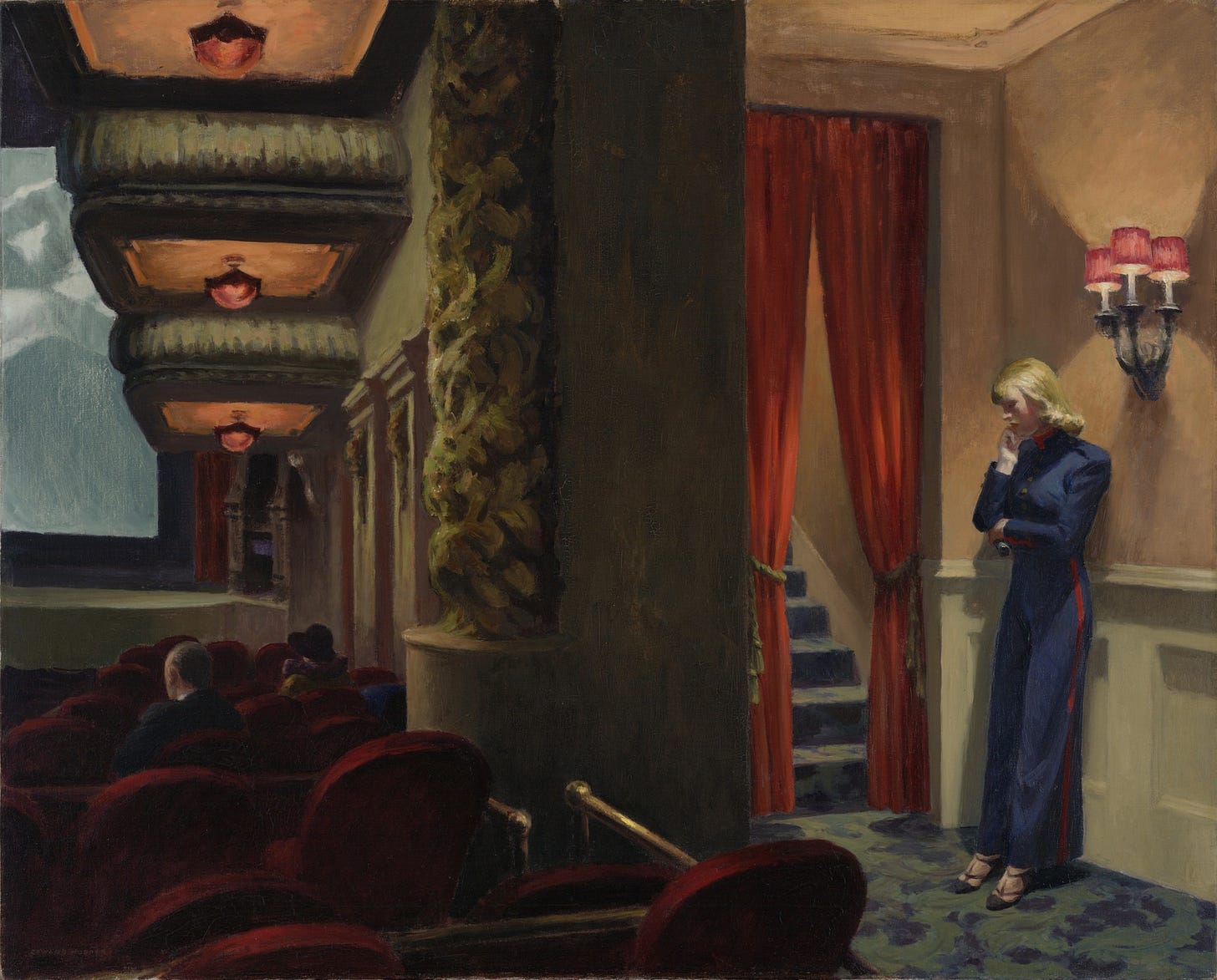Homebound and quite act of crying in theatre
Why we even cry while consuming any work of art.
Cinema is not just about stories; it is about surrender. Every time the lights go off, we agree to be hypnotized, to believe in something that we know isn’t real. And perhaps that is why cinema, more than any other art form, understands our loneliness better than we do.
One of my favourite observations about cinema comes from the French thinker Jacques Ellul, who wrote:
“The movie spectator also is alone; though elbow to elbow with his neighbors, he still is, because of the darkness and the hypnotic attraction of the screen, perfectly alone. This is the situation of the ‘lonely crowd,’ or of isolation in the mass, which is a natural product of present-day society and which is both used and deepened by the mass media. The most favorable moment to seize a man and influence him is when he is alone in the mass: it is at this point that propaganda can be most effective.”
Propaganda did not begin as a dirty word. It meant the organised transmission of ideas. Time made the word a repulsive word and that is understandable. But one thing is certain that if you want perfect hypnotism, there is no medium as efficient as cinema. The darkness of the theatre, the play of sound and images, the graceful deceit of the camera. All of it conspires to make you surrender. You sit there, believing you are watching freely, when in truth you have been quietly taken hostage by images.

Filmmaker Luis Bunuel said, in his blunt way, that film watching is a kind of hypnosis. He traced it to the same mechanics: darkness, movement, montage that quickens the mind and dulls its critical guard. Cinema can be used to free the imagination or sometimes even to choke the imagination. That is the strange beauty and the quiet danger of the medium.
This hypnosis is why, in that brief trance of two or three hours, people begin to do things that would look absurd anywhere else. I remember watching Lagaan in a theatre where people stood up, shouted, and wept as if they were watching a real match. The screen had successfully erased the lines between fiction and national duty.
Such collective madness is one side of cinema’s spell and sometimes can also be used by state to control a certain narrative. I am more interesting in another aspect of cinema which is more private. On films which makes you emotional without asking you for a call to action. It begins when your throat tightens, your eyes blur, and you realize you are about to cry in public. You hide it instinctively, afraid the stranger beside you might notice. You wonder what it says about you, that you are so weak who can weep for something projected on a wall. There is a strange relief in crying inside a theatre, but also the quiet shame of being seen when the lights return. In a city where everyone is watched, measured, and endlessly performing, the darkness of the cinema becomes the last refuge for the lonely, where one can finally cry without having to explain why.
Neeraj’s new film Homebound arrived to the kind of reception usually reserved for sublime experiences. Critics called it “devastating,” the internet called it “a lump in the throat.” Many people in the theatre, as reported, were crying. I wanted to see if the same emotion could survive in Noida (the land of tough people, where I live for now), a city where the only time people truly express their feelings is during road rage.
When the title rolled on the screen, the girl next to me began to cry. Her mother, I think, understood. She didn’t try to stop her or reach out with those gentle, well-meaning words that often ruin a moment of release. She simply sat still, carrying the quiet wisdom of someone who knows that in such moments, presence is best performed as absence. To be there, yet invisible, so the other can feel alone without being abandoned. After a while, she placed her hand on her daughter’s head, a gesture both protective and distant, as if saying, go on, take your time.
I also noticed a few people behind me who had clearly been moved. But the moment the lights came on, they straightened up, adjusted their bags, and fixed their expressions. Within seconds, they were back to scrolling, booking their Ubers and Rapidos, as if the safest way to hide emotion was to pretend that one is still consumed with the banal routine of life.
This made me wonder why people cry in the theatre when most of them haven’t lived anything close to what the characters on screen have experienced. Is relatability with the characters really a necessary condition to be moved by a piece of art? Perhaps not, because the logic behind tears is impossible to map.
While writing this piece I remember a funny post. It was about the news we often read that when Lata Mangeshkar sang the song Ae Mere Watan Ke Logon, Nehru started crying. To which a comedian on Facebook joked that: right wingers love Lata Mangeshkar because she made Nehru cry.
In one of my podcasts with Neeraj, he talked about the film Udaan and how he used to cry for hours while watching it or listening to its songs during his early days of struggle in the film industry.
When I was in Boston four years ago, a man who came to meet me told me he often cried while listening to my podcast, especially the episodes featuring stories of people from marginalized communities trying to navigate unfair lives. He said he had grown up in a privileged household, far away from that world, yet something in those stories made him weep uncontrollably. I tried to understand what exactly triggered that emotion in him, but there was no clear answer.
A few days ago, I was listening to a piece of melodic electronic music with no lyrics. Its nostalgic pulse, stitched with soft electronic beats, carried me to a place I couldn’t name. It wasn’t joy or sorrow, just a sudden rush, a quiet collapse of realizing how far you’ve traveled in life and how much you’ve left behind without noticing. There’s no logic to that moment. It remains one of the small, inexplicable miracles of art.
When I was living in a small town of Sikar in Rajasthan, there was a family of ten in the same complex. Among them lived a man who had recently rented a single room. He kept to himself, always polite, but his loneliness showed in the way he walked, and especially in the way he smiled, like someone quietly carrying a story of which he was the only audience. One evening, my mama went to watch Jaanwar, that Akshay Kumar film which, by most measure, can be called emotional. When they came back, the man went straight into his room and shut the door. Later, my mama told me he had cried through most of the film, uncontrollably. I asked why anyone would cry in Jaanwar. He said there was a song about a mother and son, and the man’s own mother had died a few years ago.
It’s strange how grief lies dormant, waiting for the most ordinary thing, and how experiences that aren’t meant to evoke anything end up stirring everything.
This also reminds me of a scene from David Lynch’s masterpiece Mulholland Drive. Betty (Naomi Watts) and Rita (Laura Harring) sit in a dark theatre as a performer tells them that everything they will hear is an illusion, that there is no band. Then a woman steps onto the stage and begins to sing Roy Orbison’s Crying in Spanish. Her voice trembles with sorrow. Midway through, she collapses, yet the song continues, revealing it was only a recording. Betty and Rita sit frozen, tears streaming down their faces.
That scene captures the peculiar genius of cinema, an art that never hides its deceit yet still manages to move us. Everything about it is false, the lights, the voice, the collapsing woman. We know it isn’t real, and still the throat tightens. That is the quiet fraud of the medium. It manufactures emotion out of illusion, and the audience, fully aware of the trick, agrees to be fooled.
In most cases, to be fooled by this medium is in itself a beautiful kind of deception. It reminds me of that line from There Is a Light That Never Goes Out by The Smiths, “to die by your side is such a heavenly way to die.”
Dear readers, I’m curious to know, what was your moment of catharsis? A film, a song, a painting, or something else that made you feel more than you could explain? Share it with me in the comments.
My debut book is now out for pre-orders. It will means a lot to me if you can pre-order it here. I write on Substack for the joy of writing. This platform doesn’t pay me, and my work depends entirely on the support of readers. If you liked this piece, you can contribute any amount on Razorpay, or if you are outside India, you can use the Buy Me a Coffee link. Thank you :)





When I was in college, I had watched a play performed by the team of Asmita Theatre Group. It was a story of a muslim man who drove autorickshaws for a living. His son had just died. Whenever that man came in contact with any passenger, he shared his grief but no one listened. It was an Indian adaptation of Chekhov's Short Story Misery. It was the first time I had cried so much in a theatre. Every single one of my friends cried unashamedly, unapologetically. Every professor, every student I could see in the darkness was sobbing relentlessly. That day I changed as a viewer.
Although I am very generous in shedding tears, one of the most curious pieces I have cried on was something called a "counter-map" in an exhibition a few years ago. Made by artist Mohamed Abusal, this imagined metro map of Gaza left me in uncontrollable tears. As a lover of public transportation who enjoys riding buses and metro, this innocent vision of having just a functioning mobility system in Gaza while being in a perpetual existential threat was both heartbreaking and heartwarming.